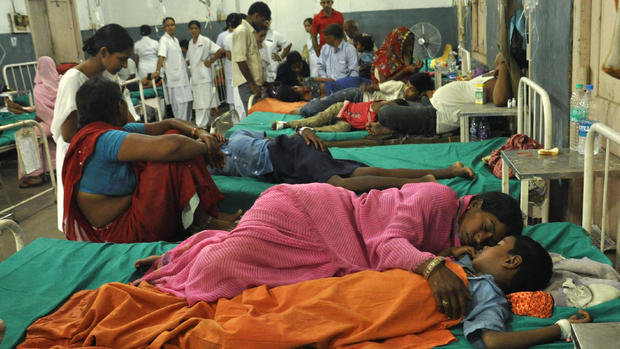Report: Indian school lunches may have been cooked with pesticide
PATNA, India A top bureaucrat in India's eastern state of Bihar where food poisoning claimed the lives of 23 children, said the Mid-Day Meal Scheme at a school could have been a result of an entire bottle of pesticide being used instead of cooking oil to cook the food, reports Reuters.
"There is a possibility because the cook said that when she poured the liquid into the vessel, foams were produced, its color was darker than oil and it smelt pungent. But still the cook was asked to use the same medium. There is a possibility that the entire bottle of toxic pesticide was used," said Amarjeet Sinha.
The two cooks of the school described how soon after they served the lunch they had prepared for dozens of children at a rural Indian school, they realized something was very wrong.
- India officials find container of pesticide in cooking area of school where 23 children died after eating tainted lunch
- Autopsies on India school children confirm 22 died from poisoning caused by insecticide in lunch
The students started fainting. Within hours, they began dying.
Some officials have said it appeared that the rice had somehow been tainted with insecticide and might not have been properly washed before it was cooked.
"It's not a case of food poisoning. It's a case of poison in food in a large quantity, going by the instant deaths," Sinha said Thursday.
More answers were expected Friday, when a forensic laboratory was to issue the results of its tests on the dead children, the food and the uncooked grain stored by the principal in her house, he said.
Police were searching for the principal, who fled after the students started falling sick, Sinha said.
The cooks, Manju Devi and Pano Devi, told The Associated Press that the principal controlled the food for the free daily lunch provided by the government at the school.
On Tuesday morning, she gave them rice, potatoes, soy and other ingredients needed to prepare the meal and then went about her business. As the children ate, they started fainting, the cooks said.
The two cooks were not spared either.
Manju Devi, 30, ate some of the food and fainted. Her three children, ages 5, 8 and 13, fell ill as well. All were in stable condition Thursday.
While Pano Devi, 35, didn't eat the tainted food, her three children did. Two of them died and the third, a 4-year-old daughter, was in the hospital.
"I will stop cooking at the school," she said. "I am so horrified that I wouldn't grieve more if my only surviving child died."
Sinha said one of the cooks told authorities that the cooking oil appeared different than usual, but the principal told her to use it anyway.
Doctors believed the food contained an organophosphate used as an insecticide, he said.
The free midday meal was served to the children Tuesday in Gandamal village in Masrakh block, 80 kilometers (50 miles) north of Patna, the Bihar state capital.
Some of the victims were buried Wednesday in front of the school building in protest.
Those who survived the poison were unlikely to suffer from any serious aftereffects from the tainted food, said Patna Medical College hospital superintendent Amarkant Jha Amar.
"There will be no remnant effects on them. The effects of poisoning will be washed after a certain period of time from the tissues," Amar said.
Amar said Thursday that the post-mortem reports on the children who died confirmed that insecticide was either in the food or cooking oil. He said authorities were waiting for lab results for more details on the chemicals.
India's midday meal plan is one of the world's biggest school nutrition programs.
State governments have the freedom to decide on menus and timings of the meals, depending on local conditions and availability of food rations.
It was first introduced in the 1960s in southern India, where it was seen as an incentive for poor parents to send their children to school.
Since then, the program has been replicated across the country, covering some 120 million schoolchildren.
It's part of an effort to address concerns about malnutrition, which the government says nearly half of all Indian children suffer from.
Although there have been complaints about the quality of the food served and the lack of hygiene, the incident in Bihar appeared to be unprecedented for the massive food program.
But with the country focused on the safety of the program Thursday, reports emerged that others had fallen ill across India.
In the southern state of Tamil Nadu, at least 100 girls became sick, vomiting and fainting, after eating lunches made with contaminated eggs, the Press Trust of India reported.
In Maharashtra, dozens of students fell ill after drinking contaminated water, media reported.
In Bihar, the state director of the feeding program, R. Lakshamanan, told PTI that some students refused to eat the lunches Thursday in the wake of the tragedy.
The national government announced it would set up a second committee to review the functioning of the meal program in addition to one that already monitors the program.
